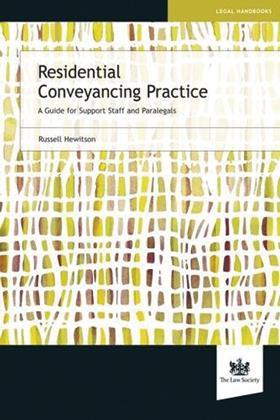Residential Conveyancing Practice: a guide for support staff and paralegals
Russell Hewitson
£39.99, Law Society Publishing, paperback

On the surface, conveyancing sounds so simple. Russell Hewitson neatly defines conveyancing as ‘…the term given to the law and practice whereby the ownership of land or of an interest in land is transferred from one person to another’. However, as anyone with any experience of this area of the law knows, simplicity is a rare bedfellow of property transfers.
The interaction between buyers, sellers, lenders, neighbours, local authorities and third-party occupiers can result in unforeseen issues arising. A seemingly simple conveyance can quickly become something quite different. This, combined with the rather nebulous areas of law that conveyancing touches on (for example, the Environment Agency General Binding Rules on septic tanks and treatment plants), makes this a delightfully challenging area to work in.
Hewitson’s book sets out to give unqualified support staff a much needed helping hand. Its aim is to help staff develop a solid understanding of the conveyancing process.
The book includes a lengthy explanation of land registration before it plunges into the practicalities of preliminary matters, contract drafting, pre-contract enquiries and searches, planning considerations, investigations of title, mortgages, exchange, new properties, and so on. It is worth noting that the focus is on registered freehold title, although there is a section on the granting of leases. Unregistered land is not discussed.
Quite simply, this book is excellent. It offers a practical explanation of property law matters and is so clear-cut that it confirms the eye-rolling opaqueness of many law school textbooks on the subject. It certainly achieves what it sets out to do. Indeed, while writing this review I have used it as a useful quick reference handbook on a number of occasions. Even having the Standard Conditions of Sale and the Law Society Conveyancing Protocol to hand (they are annexed) makes one’s work easier.
To firms, I say this book is an excellent investment for your junior team members. To support staff (and indeed law students with an interest in property), this book should probably already be on your desk.
Joshua Pugsley is a trainee solicitor at Farrer & Co































No comments yet